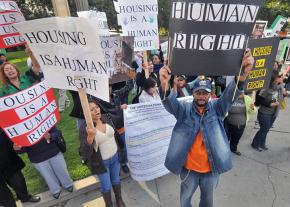Exile off Main Street
Sociologist Christopher P. Dum portrays squalor, but also efforts to create order in seriously damaged lives, writes , in a column for Inside Higher Ed.
"WE THINK about this as a studio apartment," says one member of a couple living in a single-room occupancy. In better days the unit was a motel room. To see it as a studio apartment is a triumph of imagination and will, as the speaker is fully aware. "We have to," she continues, "'cause if we continue to realize where we're at in life, we would spiral into a massive depression. And the housekeeping we do would not get done...I call it home and I cry on the thought of losing it 'cause this is all I have."
Christopher P. Dum, an assistant professor of sociology at Kent State University, is careful to protect the identities of the ethnographic subjects he spoke to in researching Exiled in America: Life on the Margins in a Residential Hotel (Columbia University Press). In exchange he has been given access to some extraordinarily precarious and fragile domestic spaces--dwellings that will seem to most readers just slightly more stable than a homeless shelter or living out of your car. But that is, by Dum's reckoning, a blinkered view. The squalor is real and inescapable; what's harder to see from a distance is the residents' effort to find, or create, some kind of order in seriously damaged lives.

The author lived at the hotel he calls the Boardwalk for a year as fieldwork for his dissertation, gradually overcoming the residents' (understandable) suspicion that he worked for law enforcement and intriguing some with the prospect of having their stories told. The hotel originally drew Dum's attention while he was investigating the difficulties of registered sex offenders in finding housing. (In the public mind, "registered sex offender" has come to mean pedophile, although the label applies equally to those convicted of exhibitionism, soliciting prostitutes or even, believe it or not, public urination.)
Also staying at the Boardwalk during the author's stay were recently released ex-prisoners and people with a range of mental-health issues, physical disabilities or substance-abuse problems, often in combination. It sounds like a population guaranteed to create even greater chaos than the sum of its dysfunctions. What Dum found instead is an emergent and fragile community of what he characterizes as "social refugees...impelled to relocate within their own country of citizenship because of the influence of social context and/or social policy."
From studies of migration he adopts the notion of push and pull factors to discuss the two strong forces shaping life at the hotel. One is the overwhelming power of stigma: the area's largely middle-class public "viewed motel residents as belonging to one or several devalued groups," with the sex offenders among them being especially contaminating and marginalizing. Driving past the Boardwalk and yelling that its inhabitants were child molesters seems to have been a local pastime.
Membership in stigmatized groups pushed residents away from mainstream society and toward the Boardwalk, which in turn pulled them to its "sustaining habitat"--a term from urban sociology akin to the real-estate mantra "location, location, location." Boardwalk residents had ready access to bus stops, cheap food, a laundromat and other "opportunit[ies] to engage in the same type of consumer relations that characterized the lives of their [better-off] detractors." There also seems to have been some comfort in knowing that their landlord owned another nearby property called Park Place. (I'd guess that the real names of these motels were just as overblown as their Monopoly stand-ins.) Park Place was cheaper, in more serious disrepair and had a reputation for violence among the tenants. "They start drinking Milwaukee's Best in the morning," one Boardwalker explains, "and that makes them get wily."
HOWEVER UNINVITING Boardwalk might look from the author's photographs, it's hardly the worst place where life could leave you. Some tenants Dum interviewed managed to establish a degree of stability that included employment (one aspect of a sustaining habitat) as well as a certain amount of interior decoration. They felt a responsibility to care for other residents, particularly those with severe mental disorders. An informal but exacting code of etiquette governed the sharing of cigarettes, food and intoxicants. A certain amount of sexual jealousy and trash talking was inevitable, as was the occasional round of threats or punches, but Dum indicates that he heard of very little theft or predation. "It's like any other community," one resident told him, "it's just people trying to get along."
At the same time, even success in carving out livable circumstances could leave residents feeling trapped. Treating one's room as a studio apartment entailed more than psychological strain. Rent "did not guarantee heat, air-conditioning, a fridge, kitchen or even drinkable water," Dum writes. "Offsetting these conditions exacted so much material cost to buy fans, space heaters, refrigerators, microwaves and bottled water that once residents settled at the hotel they found it very hard to leave. They struggled to make monthly, even weekly, rent payments, and because of this, putting down a security deposit and first month's rent for an apartment was nearly impossible."
The author's fieldwork turned out to coincide with the final phase of the motel's existence. After years of code violations--largely unnoticed by city inspectors for the simple reason that they often didn't even show up--the local government forced the closing of Boardwalk and Park Place. Exiled in America is on the whole an exemplary piece of social reportage and analysis, but while reading it I often wondered if calling his interview subjects "refugees" might not be pushing it. As it turns out, most of them found out they were being evicted a few hours before the deadline. So, yes, refugees.
First published at Inside Higher Ed.


